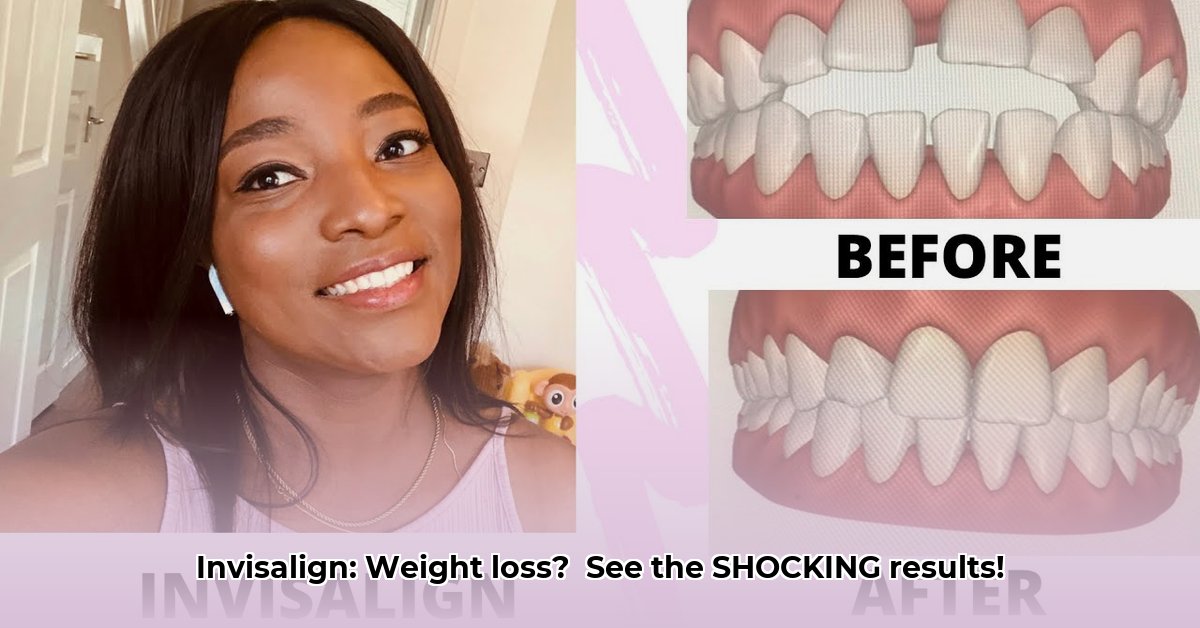
Many Invisalign users report unintentional weight loss during treatment. While not a guaranteed outcome, this phenomenon warrants exploration. This article examines the potential link between Invisalign and weight loss, focusing on altered eating habits and providing a balanced perspective, separating fact from fiction.
How Invisalign Might Impact Eating Habits
Invisalign introduces a subtle yet potentially significant change to eating patterns. The process of removing aligners, eating, brushing, and reinserting them creates a small barrier to frequent snacking. This inconvenience can discourage mindless munching, especially between meals or during leisure activities. Furthermore, the increased focus on oral hygiene may encourage healthier food choices; the need to brush thoroughly after consuming sugary drinks or snacks might reduce their consumption.
Real-Life Experiences: Before and After Invisalign
Anecdotal evidence abounds. Many individuals share stories of weight reduction during Invisalign treatment, with some reporting significant losses – as much as fifteen pounds in two months. However, it's crucial to emphasize that these are individual experiences; the amount of weight loss, if any, varies greatly. There's no scientific guarantee. This is not a weight-loss program.
The Scientific Evidence (or Lack Thereof)
Currently, robust scientific studies directly linking Invisalign to weight loss are lacking. No definitive cause-and-effect relationship has been established. Further research is needed to clarify this association. Therefore, any claim suggesting Invisalign as a primary weight-loss method is currently unsubstantiated.
Setting Realistic Expectations
- Avoid unrealistic expectations: Weight loss from Invisalign, if any, is a potential side effect, not a primary outcome.
- Healthy habits remain vital: Maintain a balanced diet and regular exercise. Invisalign is a supplementary factor, not a standalone solution.
- Consult professionals: Seek guidance from your orthodontist and a registered dietitian or nutritionist for personalized advice.
Ethical Considerations: Responsible Communication
Promoting Invisalign as a weight-loss tool is ethically problematic. It's crucial to avoid misleading claims. Invisalign's primary function is teeth straightening; any weight change is a secondary, unpredictable effect.
Diverse Perspectives: A Holistic View
While some individuals experience weight loss with Invisalign, it shouldn't be considered a reliable method for weight management. The impact is indirect and modest at best. More research is required to understand the correlation fully. Managing expectations is paramount.
Stakeholder Perspectives
| Stakeholder | Short-Term Expectations | Long-Term Outlook |
|---|---|---|
| Patients | Potential for minor, unintended weight loss. | Maintaining healthy lifestyle habits regardless of Invisalign treatment. |
| Dentists | Addressing patient inquiries regarding weight changes honestly and factually. | Integrating brief discussions of healthy food choices into Invisalign consultations. |
| Researchers | Conducting studies to investigate the potential link between Invisalign and weight loss. | Determining the nature of the correlation, and establishing relevant treatment guidelines. |
| Weight-Loss Industry | Avoiding deceptive marketing that links Invisalign to weight loss. | Exploring behavior modification strategies indirectly influenced by Invisalign. |
Maintaining Healthy Eating Habits with Invisalign
Invisalign requires dietary modifications. Certain foods can damage or stain aligners; proper oral hygiene is crucial. Understanding how to maintain healthy eating habits while using Invisalign is key to treatment success. Weight changes might occur, but they're largely indirect and individual.
Invisalign and Dietary Considerations
Hard, crunchy foods (apples, ice) should be avoided, as they risk damaging the aligners. Sticky foods can get trapped, and highly pigmented foods and drinks (coffee, red wine) can stain them. Careful meal planning is essential.
Recommended and Restricted Foods
Recommended: Soft foods (mashed potatoes, yogurt, soups), cut-up soft fruits, well-cooked meats. Restricted: Hard candies, nuts, sticky sweets, highly pigmented foods and drinks.
A Practical Guide to Healthy Eating with Invisalign:
- Plan meals: Choose soft, aligner-friendly options.
- Remove aligners: Before every meal and snack (except water).
- Clean thoroughly: Brush and floss after every meal; rinse aligners with cool water.
- Stay hydrated: Drink plenty of water.
- Healthy substitutions: Opt for smoothies instead of hard fruits, and soft vegetables instead of crunchy chips.
The Weight Loss Aspect: A Balanced Perspective
Anecdotal reports of unintended weight loss with Invisalign often stem from increased mindful eating, leading to healthier choices with potentially fewer calories. However, this isn't a direct weight-loss strategy. While some weight loss might occur, it shouldn't be the primary expectation. Maintaining good oral hygiene is crucial. Thorough brushing and flossing prevent cavities and gum disease.